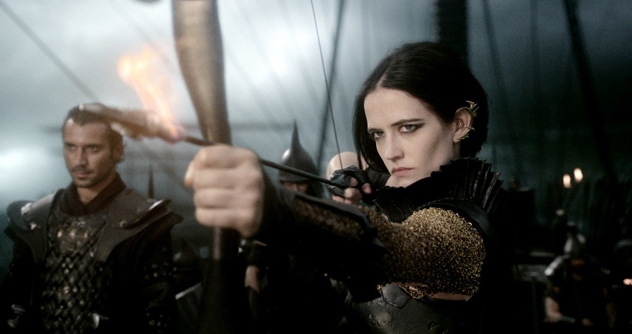
300: Rise of an Empire
Rated R {3/5 stars}
Braveheart is the worst movie I ever once liked. It is positively unwatchable—an embarrassing spectacle of unconditional absurdity. In fact, here are three things I’d rather do right now than ever again watch Mel Gibson’s portrayal of William Wallace:
1. Drink Mongolian fire sauce on top of a burning anthill.
2. Buy a one-way ticket to the Crimea.
3. Wrap my mouth around an exhaust pipe and floor it.
Braveheart and the first 300 are third cousins; the latter seeming to me a waste of potential rather than a ludicrously acted and outright phony hagiography. 300 is beautifully crafted Frank Miller ultra-violence amid the backdrop of a Sin City-affected Spartan Greece, which unfortunately morphs into a toga party at the local Alpha Beta house. Granted nobody goes to an effects-driven Gerard Butler flick looking for Marlon Brando and the meaning of life, but acting and content have got to count for something. Needless to say my expectations weren’t sky-high going into 300: Rise of an Empire. But expectations are like assholes insofar as everybody’s got ‘em and they usually stink.
Directed by heretofore unknown Noam Murro, Rise of an Empire picks up where its predecessor left off: King Leonidas and his horde of 300 lay dead on the battlefield at the feet of Xerxes and the Persian army. Emboldened by his victory, Xerxes marches his throng toward Athens, which he is intent upon razing to the ground. Through the narration of Spartan Queen Gorgo (Lena Headey, Game of Thrones), we learn of Xerxes’ mystical transformation from ordinary man to God King. Revealed is how Themistokles (Sullivan Stapleton), one of Greece’s greatest warriors and admiral of the Athenian fleet, played an unforeseen role in Xerxes’ rise to power while defending the country from Persian invasion in a prior conflict. It is now the responsibility of Themistokles and his out-numbered navy to stave off Persia’s superior force while the cry for a united Greece rings out to each city-state.
If you look at the nuts and bolts of that synopsis, it’s more or less the framework for any movie attempting to tell the tale of an epic Greek or Roman struggle, in that it’s sprawling and leaves much license for storytelling. The problem with movies like 300 is that they aren’t really trying to tell a story so much as they are looking for a vehicle to showcase action. Ultimately they get in their own way. But Rise of an Empire manages to avoid archetypal flaws, at least in the most sufferable ways, essentially clearing its own path. For example, Eva Green (Casino Royale, The Dreamers) plays Artemisia, ruthless queen of the Persian military and Xerxes’ closest personal ally. Greek-born but Persian-bred after being raped and pillaged by territorial Greek forces as a child, Green is convincing as a damaged, pitiless killer and adds a consistent female presence to a movie otherwise dominated by men. What’s more is Rise of an Empire’s slight dialing back on the William Wallace meter. Yeah, there’s some definite “but they will never take, OUR FREEDOM!” moments, but they’re a little less frequent, and when they do pop up, are somehow less abrasive and bro’d out.
This overall state of tolerability allows the viewer to focus on the one reason they came in the first place: Orchestral violence and gore. Say what you will about the merits of cinematic ultra-violence and its inevitable misuse, but Rise of an Empire is the Mozart of the genre. Set largely at sea aboard Greek triremes and the Persian equivalent, the famed slow-motion mayhem of the first film is only enhanced this go-round by the crashing black waves of the Aegean Sea and the mirror straits of Salamis. A visual delight of Greco morbidity replete with decapitations, severed limbs, slashed jugulars and everything else that can possibly be sliced, Rise of an Empire is immensely fulfilling as a purveyor of high camp brutality. Remember, though: This is not Hostel. This is something more parallel to an elegant vaudevillian riot, if one can imagine such a thing.
But all moderate praise aside, if you don’t like over-the-top senseless violence, you’re not going to like Rise of an Empire. Even if you do, you still might hate it. But if you liked 300, or even thought it had latent potential, you’ll probably really dig it. I hope that’s a reasonable conclusion. Because all I can think about right now is that scene in Braveheart where Mel Gibson shows everyone his taint.


Comments